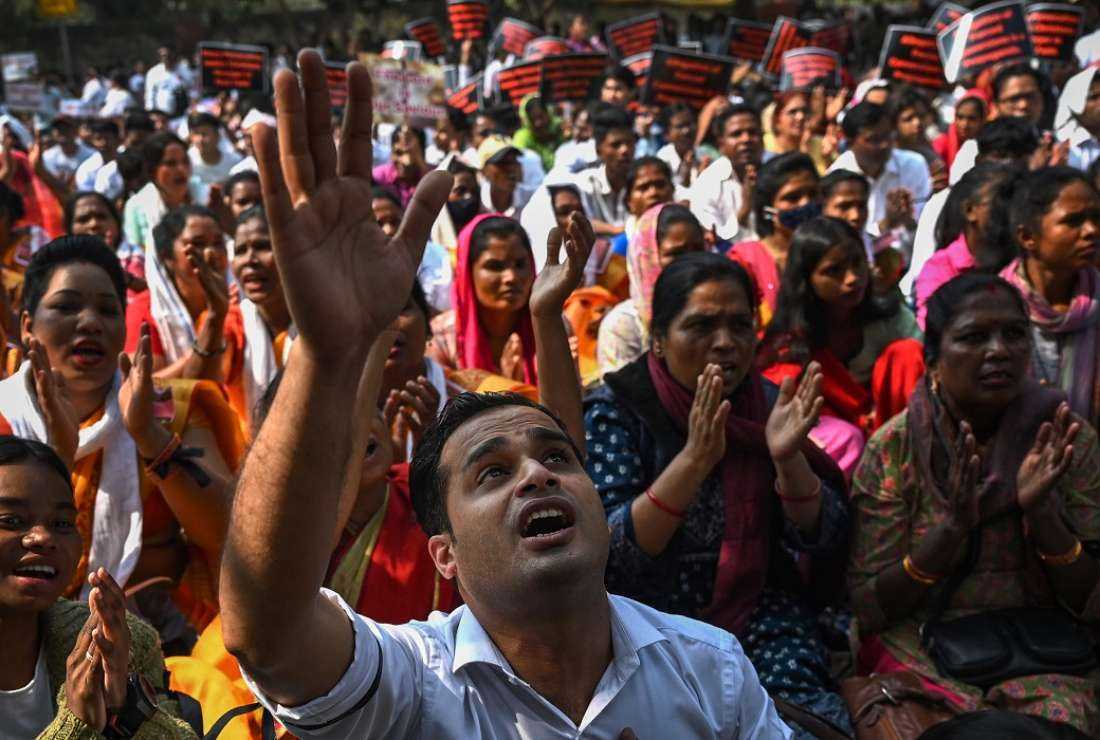Pro-Hindu party leaders have called for an economic embargo against Christian and Muslim businesses in Chhattisgarh

Activists and members representing the Christian community display placards as they take part in a peaceful protest rally against what the claim is an increase in hostility, hate, and violence against Christians in various states of the country, in New Delhi on Feb. 19, 2023. (Photo: AFP)
Minority Christians and Muslims in a central Indian state have called for tough action against a group of right-wing activists who have urged the Hindu majority to boycott shops and establishments owned by them.
“We want exemplary action taken against all those who have called for a boycott of Christian and Muslim business establishments,” said Jitendra Faular Singh, secretary of the Inter-Denominational Church Fellowship, which represents 18 Christian groups in the tribal-dominated Bastar region in the central Indian state of Chhattisgarh, which goes to polls this year.
“We have submitted petitions to the commissioner and the inspector general of the Bastar division,” Singh told UCA News on April 19, nine days after pro-Hindu Bharatiya Janata Party (BJP) leaders and its affiliates such as the World Hindu Council (Vishwa Hindu Parishad) and the Bajarang Dal (party of Hanuman, the monkey god) openly took a public pledge on April 10 in Jagdalpur, the divisional headquarters of the Bastar region, to call for an economic embargo against Christian and Muslim shops and business establishments.
“The officials have agreed to look into our demand,” Singh said.
The Anjuman Islamiya Committee, a Muslim group, in another petition to the commissioner, said, “The boycott call has deeply pained the Muslim community that lives in peace with other communities.”
He sought action against those behind it.
“Some of my upper caste customers have now stopped visiting”
In the boycott call, the pro-Hindu leaders told shops and establishments owned by Hindus to put up signboards to indicate their Hindu identity.
“This kind of call for an economic boycott of any community amounts to disturbing peace and communal harmony and therefore, they should not be spared,” Singh said.
It is not yet clear whether the police have initiated any action against them.
“We will again approach the officials for action,” Singh said.
Though shops and establishments owned by Christians and Muslims have not seen a fall in their income due to the boycott call, a Christian businessman, who did not want to be named, told UCA News on April 18, “Some of my upper caste customers have now stopped visiting my shop.”
“They used to be regular customers and now I see them going to other shops owned by Hindus,” he said.
S Kasimuddin, a Muslim businessman, told UCA News, on April 19, “Those who made the discriminatory call are openly negating our great constitution that calls for fraternity and brotherhood.”
“Exemplary action should be taken against them,” Kasimuddin said.
Mnu Varghese, a businessman and the state’s ruling Congress party leader, accused the BJP of creating disharmony ahead of state assembly polls this year.
After the boycott call snowballed, the BJP, which previously ruled Chhattisgarh, distanced itself from the campaign, saying, “It does not support social discrimination.”
The party, which currently heads the federal government under the leadership of Prime Minister Narendra Modi, asserted in the statement that it is determined “to work for the development of society as a whole.”
Christians make up less than 2 percent of Chhattisgarh’s 30 million population and the state has a tribal population of 7.5 percent. Muslims constitute 2.02 percent of the state’s population.
Christians in the Bastar region have been subjected to unprecedented violence since October last year, forcing more than 1,000 to flee their homes.
Though the government claimed all of them had returned, Church leaders said that “many did not return, fearing for their lives.”

